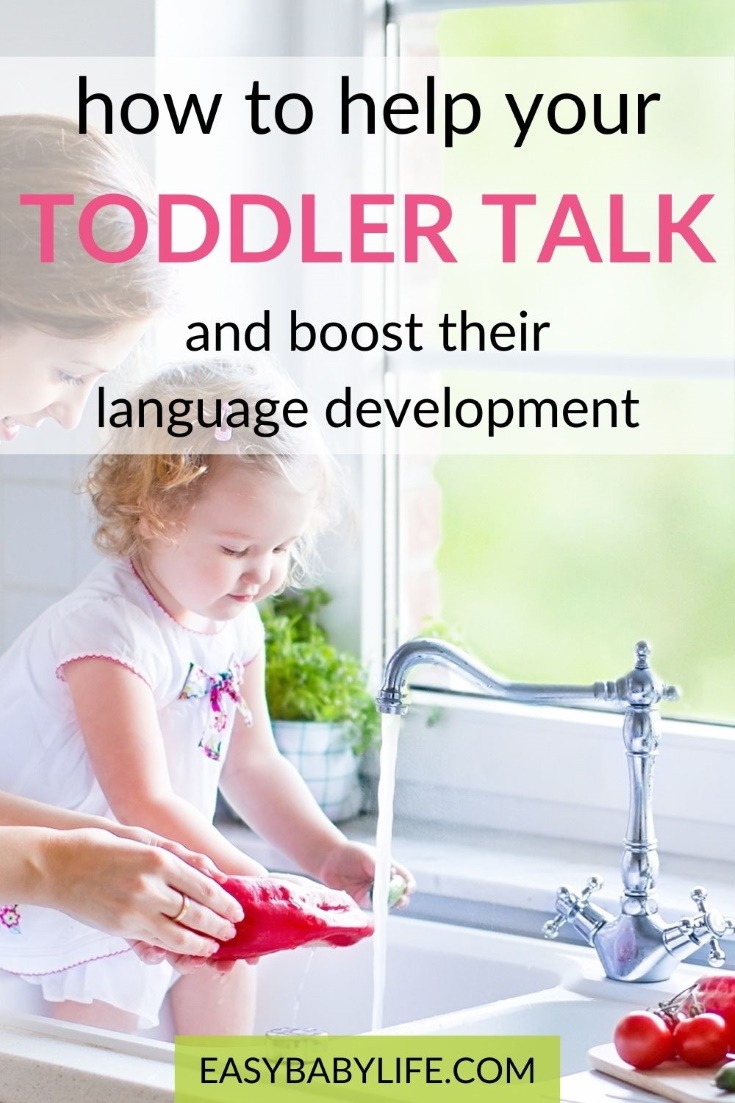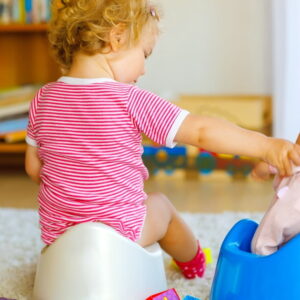You have made it through the baby months, and now you are looking for tips on how to help your toddler talk.
Below you can find some simple things you can do as a parent to encourage your toddler’s language development and get them talking.

How to Get Your Toddler to Talk & Language Development Milestones
In this article…
Toddler Language Development
From the moment your baby is born, they will make lots of different noises and sounds.
They will coo and babble for a while, and sometime during their first year, they may even say their first word, usually “mama” or “dada”.
Between 12-24 months is when children will learn to produce new sounds, expand their vocabulary, and even start to speak short sentences to express their needs and ideas. Sometimes only you will be able to understand what they are saying as their speech is still developing, but they are starting to talk.
From 24-36 months, your toddler’s speech will become clearer for others, and they will start to speak in longer sentences as time goes on.
While you can’t rush a child’s natural language development, there are a variety of things you can do as a parent to help your toddler talk.
Remember that all children develop differently, and try to avoid comparing your little one to other children of the same age.
How to Help Your Toddler Talk in 7 Easy Ways
“How can I help my toddler talk?” is a common question parents ask themselves. The most important thing you can do is talk to them as much as you can! Sounds too simple, doesn’t it? Well, it is a little complex but not difficult. Here are seven ways you can help your toddler’s language development and get them talking.
1. Talk and narrate everything you do
The more you talk to your toddler, the more words they will hear and the more exposure they have to different words and sounds. You may feel silly talking all day to a little person who hardly talks back to you, but don’t be fooled; they are taking in everything you are saying and keeping it stored for later.
Go about your day, talking to your little one, asking questions, and narrating your actions.
Invite your toddler to participate in what you’re doing, such as doing the dishes, folding clothes, picking flowers, washing the car, or whatever you are up to. As a bonus, your toddler will be happy to be able to help you.
When you are getting them dressed, name each piece of clothing and explain each step. At bath time, name each body part as you wash your little one. When you are having dinner, describe the foods, the textures, and the taste.
The more you talk, and the more words you use will help your toddler talk when they are ready to.
2. Use eye contact as much as possible
Eye contact is important if you are trying to help your toddler talk because it helps to maintain attention. It tells your little one that you are there and ready to communicate.
Make sure you are directly in front of your child when you talk to them. Look in their eyes when you speak and talk clearly. Play simple games like “Where’s your nose?” or “Peekaboo”, or make funny faces together.
Having your toddler’s complete attention while you talk will ensure they listen and take in everything you say.
3. Leave out the baby talk
While it is tempting to start talking to toddlers with a high-pitched voice in that baby talk voice using simple words, one of the best things to help your toddler talk is to talk properly, demonstrating the correct way to say words.
Toddlers are smarter than you think, and learning to talk is part of their natural language development. It’s best to refrain from using “easy words” or shorter versions because you think your child won’t be able to repeat them.
According to studies (referenced below), baby talk is actually less clear than normal speech, so it is easier for them to understand if you simply talk as you normally would.
4. Read lots of books together
As a parent, reading is one of the best things you can do to help your toddler’s language development. Books contain different words and phrases that children may not hear on a regular basis. By reading to your toddler every day, you are adding hundreds of new and diverse words to their vocabulary, even if they haven’t started talking yet.
Reading to your child is a great habit to get into, especially because toddlers love to imitate their parents. What better than instilling a love for reading and learning from the very start?
5. Sing songs and nursery rhymes
Singing songs and reciting nursery rhymes is another great way to get your toddler talking. Most toddlers naturally love music and the sound of their mother or father’s voice, so singing together is the perfect combination to boost their language skills.
Also, the benefits of music are endless; not only will your toddler be exposed to new words, but also rhythm and tone. In addition to singing at home, baby/toddler music classes can be a fun activity to do together!
6. Play, and play some more
As many experts will advise, a huge part of a child’s language development is intensified through play. The best thing you can do to help your toddler talk is to play with them.
Allow your toddler to take the lead and follow them through games and activities they enjoy. Talk and narrate while you play together, point to certain objects, and name the things you play with, especially their favorite toys. Repeat over and over again, and encourage your little one to repeat things you say.
Children learn so much through play. It could be a simple activity like playdough where you talk about shapes and colors. It could be playing with puppets, playing dress-up, or playing pretend. It could even be an easy game of cards or memory. As long as you talk to your toddler while playing, their language should continue to develop naturally.
7. Monitor your toddler’s screen time
With all the new smartphones and handheld devices, young children spend more time looking at screens than ever. According to research (reference below), too much screen time for toddlers can be associated with speech and language delays.
This is especially true for passive screen time, such as watching television shows and movies and staring at the screen for long periods of time without any interaction.
Sure, it can be tempting to have the TV on, even in the background, or to let your little one play games on your phone because they are attracted to the music and flashy apps. But keeping it to a minimum during those early years is recommended if you want to help your toddler talk and help them to communicate.
If you do choose to allow screen time, try to make it interactive, such as tv shows with singing and dancing. Or apps that encourage kids to interact, repeat, or make sounds.
Toys to Boost Toddler Language Development
- Interactive books, like Peek-a-WHO, are great for engaging your toddler in conversation.
- If your toddler loves reading together with you, consider a book subscription service.
- For some more action, check out ThinkFun Roll and Play. It’s a game to play together with your toddler. You take turns rolling a big soft dice and do whatever a certain card tells you to do. Many toddlers really love this, and it stimulates communication and language development.
When should I be concerned about my toddler not talking?
All children develop differently, and some toddlers start to talk a little later than others. Most of the time, there is no need for concern, and they will simply catch up. However, there are certain red flags regarding children’s language development to help you decide if it is time to consult a specialist, such as a speech therapist, to discuss your toddler’s language development.
Need for Speech, Language Evaluation Red Flags
- At 12 months – Your baby does not babble, point, or gesture
- At 15 months – Your toddler doesn’t use at least three words
- At 18 months – Your toddler does not say mama, dada, and other names
- At 2 years – Your toddler should be using at least 25 words
- At 2.5 years – Your toddler should be using two-word phrases
- At 3 years – Your toddler should know at least 200 words and ask for things by their names rather than just pointing
- Also, language milestone regression at any age needs to be evaluated.
A speech therapist will usually ask you questions such as how many words your toddler uses. A great habit is keeping a diary to track your progress before you make the call. Take notes on the words your toddler uses and the gestures and nonverbal cues they use to communicate. Write down new words as you hear them used and how often they are used.
As a parent, you know your child best. If you are concerned about your toddler’s language development and are after more advice on how to help your toddler talk, it is best to identify a problem, if there is one, as soon as possible, so you can speak with a professional and take any steps needed to assist your little one.
How About Language Development for Babies?
Indeed, language development starts long before the first word is spoken. You’ll find inspiration here on how to teach your baby to talk, baby language development, and when babies say their first word.
This post is written by Chontelle Bonfiglio, writer, and educator. She holds a BA in Social Science and enjoys studying language development and bilingualism. After traveling and teaching English to children overseas for over a decade, she is now raising her own bilingual kids in her hometown Melbourne, Australia. Chontelle is the founder of Bilingual Kidspot.
Readers’ Questions about Toddler Language Development
- Is my 21-month-old normal if not talking?
- My 15-month-old toddler can’t walk or talk?
- My toddler is not talking, is rolling their eyes, and has tantrums…
Read More About Toddler Development
- Toddler Development Milestones, Red Flags, Fun Activity Tips
- Toddler Development Articles, Tips, and FAQs
Research References
- Association for Psychological Science: ‘Baby Talk’ Is Less Clear Than Normal Speech
- American Academy of Pediatrics: Handheld screen time linked with speech delays in young children
- McLaughlin MR. Speech and language delay in children. Am Fam Physician. 2011 May 15;83(10):1183-8. PMID: 21568252.

Paula Dennholt founded Easy Baby Life in 2006 and has been a passionate parenting and pregnancy writer since then. Her parenting approach and writing are based on studies in cognitive-behavioral models and therapy for children and her experience as a mother and stepmother. Life as a parent has convinced her of how crucial it is to put relationships before rules. She strongly believes in positive parenting and a science-based approach.
Paula cooperates with a team of pediatricians who assist in reviewing and writing articles.







Hi Paula! Great article. Everything someone needs to know before baby birth it is provided there, But I am wondering what if you provided Youtube Videos for that anyways Great Article, We are having a baby so I was trying to find the knowledge before the baby’s birth and I came to this great article which fulfills everything, Thanks a lot for articles like these.
Hi and thank you for your kind words. Unfortunately no videos yet. :-) Good luck with your pregnancy and baby!